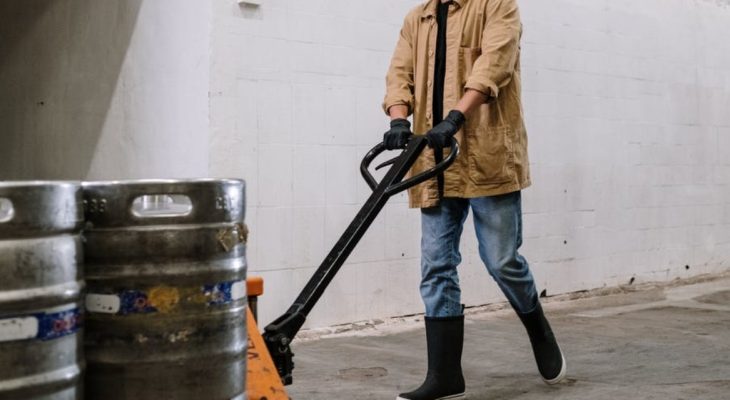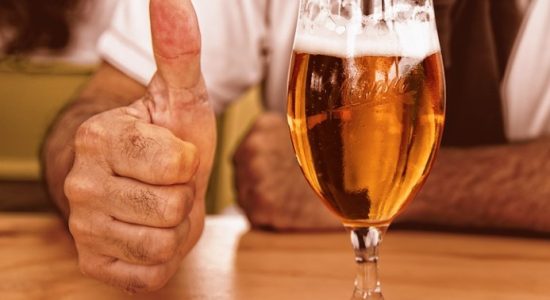Why Does Beer Need To Be Boiled? Full Explanation

The beer-making process is precise, so you must do everything correctly. A critical part of brewing beer is boiling. If you’re new to it, boiling beer might seem strange, so let’s get into why it’s so important.
Beer needs to be boiled because the high temperatures kill harmful bacteria that could contaminate the beer. Boiling has other benefits during brewing, including enzyme control, balancing sweetness and bitterness, and eliminating smells.
This article will discuss why beer needs to be boiled in more detail. Read on to learn more about boiling during the brewing process!
Main Reasons To Boil Beer
Brewing beer is a hobby for some and a job for others. No matter what it is to you, you must boil it properly and understand why it’s important.
Here are the main reasons to boil beer:
- Balance sweetness and bitterness
- Control enzymes
- Kill bacteria
- Get rid of smells in the wort
- Control proteins
I’ll discuss each of the above reasons in more detail below.
Balance Sweetness and Bitterness
Hops are added during the boiling process. They are extremely important in the brewing process and must be added during boiling. Doing this will positively impact the flavor of your final product, giving it some much-needed bitterness.
Before adding hops, the taste is mainly sweet to the point where it’s unenjoyable to drink. So you must always use hops during the boiling process if you want your beer to be tasty and drinkable with a bit of tang.
In addition to adding bitterness to the beer, hops naturally preserve it, helping it last longer. The hops also help with keeping the beer’s head intact for longer.
Control Enzymes
When brewing beer, it’s essential to control the enzymes to stop their activity. Boiling is the best way to do this, so it’s an important step.
You might be wondering why it’s crucial to control enzymes in beer–it’s primarily because it stops the carbohydrates from breaking down too much.
Enzymes are responsible for breaking down carbohydrates in the beer. While this is a favorable reaction, it must be managed by boiling. Ultimately, boiling and controlling the enzymes will make the final product more desirable.
Kill Bacteria
Boiling kills bacteria in many things, not just beer. As a result, failing to boil your beer could leave unwanted bacteria in your beer that could affect its taste and potentially make it unhealthy.
Some of the most common types of bacteria found in beer before brewing include:
- Lactobacillus Brevis
- Lactobacillus Lindner
- Pediococcus damnosus
- Pectinatus cerevisiiphilus
- Pectinatus frisingensis
- Megasphaera cerevisiae
Get Rid of Smells in the Wort
You might notice bad smells in your wort, and that’s normal. Thankfully, boiling helps remove unpleasant odors if you do it for long enough. The main culprit for odd smells in wort is the sulfur compound, dimethyl sulfide (DMS).
While boiling for a certain period should remove the unpleasant smells of the DMS, you want to avoid boiling for too long. Boiling for an extended period might remove pleasant aromas and taste, but you certainly want to preserve those!
I’ll discuss how long you should boil beer during brewing later in the article.
Control Proteins
Boiling beer not only controls enzyme activity but also allows you to control protein activity. Proteins eventually lump together in the beer mixture when boiled for long enough. This makes them easier to remove later during the brewing process.
Can You Avoid Boiling Beer?
You can’t avoid boiling beer because it’s an essential step of the beer-making process. If you avoid boiling your beer, it will significantly affect the final product potentially making it undrinkable and even unhealthy.
Here’s What Happens if You Don’t Boil Beer
Hopefully, you now understand the importance of boiling beer and why you should do it. But if you’re still wondering whether or not it’s possible to avoid the boiling step, you should be aware that it will ruin the final result! You don’t want to do all that hard work to ruin your beer.
Below are the main things that will go wrong if you don’t boil beer.
Unpleasant Aromas in the Final Product
As I mentioned in the first section of this article, boiling beer helps balance bitterness and sweetness. It’s essential to add hops during boiling to avoid a taste that’s too sweet and syrupy.
Without boiling, you can’t use the hops to give your beer a tasty and slightly bitter flavor. The taste you want to achieve will determine when you use the hops.
But it’s not just taste that benefits from boiling; boiling also affects the smells. If you avoid boiling your beer, you might notice foul odors throughout the brewing process. As I mentioned, boiling removes the beer’s unpleasant sulfur smells (especially DMS).
The Beer May Be an Odd Color
Failing to boil your beer could affect the color. Although this might not be a big issue in terms of health and safety, it’s still something you want to avoid. Beer is supposed to have a distinct color, and boiling gives it that.
So if you avoid the step altogether, it will probably look oddly light. Again, this doesn’t affect the taste or smell, but it will look off.
There Could Be Harmful Bacteria in the Beer
It’s essential to ensure your beer is safe before consuming it. One of the main reasons boiling beer is so important is that it kills harmful bacteria, sterilizing the mixture and making it safe for consumption. This bacteria is bad for several reasons:
- It can make you sick.
- It can negatively affect the shelf life of your beer.
- It can negatively affect the taste of your beer.
And this doesn’t just relate to beer; anything with harmful bacteria will taste bad and possibly make you ill.
How Long Is Beer Boiled During Brewing?
Beer is generally boiled for around 60 minutes during brewing, although it can depend on the type of beer and results you desire. Some people boil their beer in as little as 15 minutes, while others might boil it for many hours.
It’s best to boil it for a bit longer because it gives the hops more time to work, giving the beer more bitterness. Most people wouldn’t boil their beer for longer than 90 minutes unless they want specific results, so it’s unlikely that you’d need to boil yours for this long.
Here are the average boiling times for some of the different beer types:
- Ale: 60 minutes
- IPA: up to 90 minutes
- Lager: up to 90 minutes
Is All Beer Boiled?
All beer is boiled because it’s a vital step in beer-making. Boiling improves thickness, taste, smell, and removes bacteria in beer. All kinds of beers, including ale, stout, and lager, are boiled before consumption.
Thankfully, the process isn’t long and can sometimes be done in as little as 15-30 minutes.
Boiling Beer at Home
Now that you have the basic information on the importance of boiling (and why it’s never a good idea to avoid it), you might wonder how to do it at home. Once you have the right tools and ingredients, boiling beer at home is simple.
Before getting started, you’ll need the following:
- Wort
- Small wort kettle suitable for home-use
- Hops
- Malt extract
- Grains
Read below to understand better how to boil beer at home.
Boil Your Wort
Before boiling, you should have already made your wort. The wort is probably the most important part of the whole process, so it’s important to have it ready for boiling once it’s time.
Once that’s done, you want to have the wort in your wort kettle and bring it to a boil. The amount of time you boil it will depend on the results you’re looking for and the type of beer you’re making.
In most cases, a total boiling time of 60 minutes is enough. But you might want to boil for longer (or shorter), and that’s fine!
Just ensure you boil it long enough so that the harmful bacteria is gone. You also want to keep the lid off when boiling wort because it allows the unpleasant smells to leave the kettle.
Leaving a cover on will trap the odors, and they’ll seep back into your beer–this will undoubtedly impact the taste, so be sure to remember this step.
Add Hops for Flavor and Complexity
The next step of the boil is to add hops. You can add hops at different times, depending on the taste and aroma you’re looking for. Adding the hops early in the boiling process is good if you want more bitterness.
However, it’s best to add hops throughout the boiling process to give your beer multiple dimensions.
After adding the first set of hops, you should add the second set a while later. These hops should enhance the flavor of your brew, so it’s an important step! You can add another set of hops at the end if you want, which will further develop the flavor and smell of the final product.
Add Irish Moss
Add Irish moss to your wort in the last 10 minutes of the boil. It will help clarify the wort, so you won’t have to go through an extra filtering process. Making the wort clearer by adding Irish moss will also help give you a brighter and more attractive final product.
You can buy Irish moss from any home brewing store, so it’s usually easy to find. For standard home brewing, you generally only need a tiny amount of Irish moss, so you don’t have to break the bank to use it.
However, using Irish moss doesn’t affect the taste much, so you can get by without it. Another thing that makes the beer appear more transparent is gelatin, which you can use instead of Irish moss.
However, you don’t apply the gelatin to the mixture during the boil–you use it during cold crashing. And like with Irish moss, gelatin doesn’t significantly impact the taste or texture of the final product.
Chill Your Wort
Once the boiling is finished, you want to chill your wort. You can’t just leave it at room temperature–you must use a wort chiller or another cold method.If you plan on making beer at home regularly, consider investing in a wort chiller to expedite the process.
Here’s how to use a wort chiller:
- Clean it before use. Your wort will be in direct contact with your wort chiller, so make sure it’s spotless.
- Connect the tube to your tap. You can connect the wort chiller to your kitchen tap and ensure it’s working by testing it.
- Place the wort chiller into your wort. Once you’re ready, you can place the chiller into the beer. It will depend on how much product you have, but 5 or 6 gallons (19 or 23 liters) should cool the wort down within 20-30 minutes.
- Get it to your desired temperature. The temperature you need will depend on the type of beer, so make sure you know this before brewing.
- Transfer to a fermenter. Once your wort is chilled enough, you need to transfer it to a fermenter for the next stage of the process.
If you don’t have a wort chiller, you can place the wort kettle in a sink with cold water or ice. If using ice, be sure to top it up every few minutes. If using water, replace it every few minutes. These methods will likely take longer than a chiller and require more effort.
Can You Boil Beer for 5 Minutes?
You can’t boil beer for 5 minutes because it’s not enough time to kill bacteria and give you the final product you need. A 5 minute boil also does not leave enough time for you to add your hops and allow them to work on the wort.
Conclusion
Beer needs to be boiled for various reasons. While most reasons are essential, some are more for preference.
To recap, here are the most important reasons you should boil beer:
- To balance sweetness and bitterness
- To control the enzymes
- To kill harmful bacteria
- To get rid of smells in the wort
- To control proteins
Generally, 60 minutes of boiling time is the sweet spot for most beers. You may need to boil for a longer or shorter amount of time, depending on the type of beer and the results you’re looking for.



